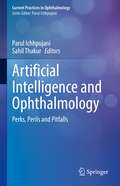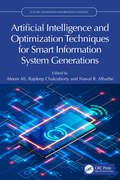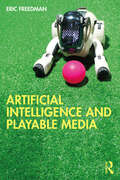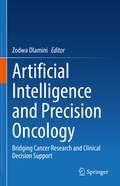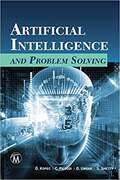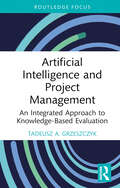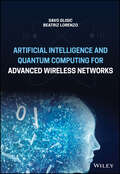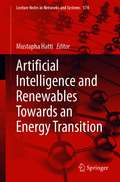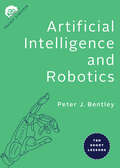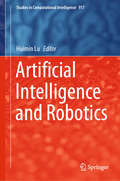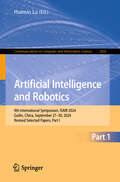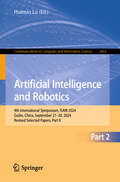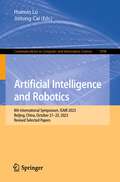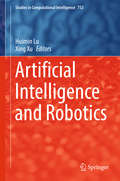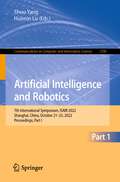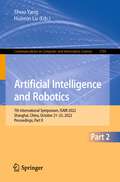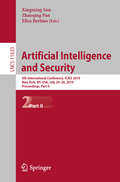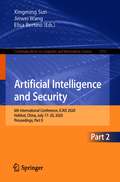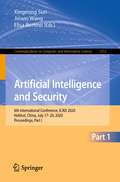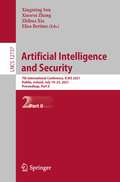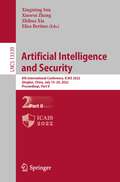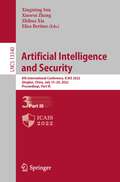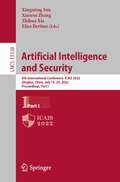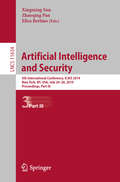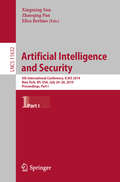- Table View
- List View
Artificial Intelligence and Ophthalmology: Perks, Perils and Pitfalls (Current Practices in Ophthalmology)
by Parul Ichhpujani Sahil ThakurThe book helps to explore the vast expanse of artificial intelligence-based scientific content that has been published in the last few years. Ophthalmology has recently undergone a silent digital revolution, with machine learning and deep learning algorithms consistently outperforming human graders in studies published across the globe. It is high time that a resource that breaks this information behemoth into easily digestible bits comes to the fore. This book simplifies the complex mechanics of algorithms used in ophthalmology and vision science applications. It also tries to address potential ethical issues with machines entering our clinics and patients’ lives. Overall it is essential reading for ophthalmologists/eye care professionals interested in artificial intelligence and everyone who is looking for a deep dive into the exciting world of digital medicine.
Artificial Intelligence and Optimization Techniques for Smart Information System Generations (Future Generation Information Systems)
by Aleem Ali Rajdeep Chakraborty Nawaf R. AlharbeThe text comprehensively focusses on the use of artificial intelligence and optimization techniques for creating smart information systems. Focuses on extracting information from blockchain repository using artificial intelligence and machine learning algorithms Presents deep learning models to identify and locate objects within images and videos, making it possible for machines to perform tasks such as self-driving cars, surveillance, and robotics Discusses artificial intelligence and optimization techniques for geographic information system (GIS) generation such as spatial data processing Covers artificial intelligence algorithms such as dimensionality, distance metrics, clustering, error calculation, hill climbing, and linear regression Illustrates topics such as image recognition, natural language processing, fraud detection, information system security, and intrusion detection system
Artificial Intelligence and Playable Media
by Eric FreedmanThis book introduces readers to artificial intelligence (AI) through the lens of playable media and explores the impact of such software on everyday life. From video games to robotic companions to digital twins, artificial intelligence drives large sectors of the culture industry where play, media and machine learning coexist. This book illustrates how playable media contribute to our sense of self, while also harnessing our data, tightening our bonds with computation and realigning play with the demands of network logic. Author Eric Freedman examines a number of popular media forms - from the Sony AIBO robotic dog, video game developer Naughty Dog’s Uncharted and The Last of Us franchises, to Peloton’s connected fitness equipment - to lay bare the computational processes that undergird playable media, and addresses the social, cultural, technological and economic forces that continue to shape user-centered experience and design. The case studies are drawn from a number of related research fields, including science and technology studies, media studies and software studies. This book is ideal for media studies students, scholars and practitioners interested in understanding how applied artificial intelligence works in popular, public and visual culture.
Artificial Intelligence and Precision Oncology: Bridging Cancer Research and Clinical Decision Support
by Zodwa DlaminiThis book highlights the use of artificial intelligence (AI), big data and precision oncology for medical decision making in cancer screening, diagnosis, prognosis and treatment. Precision oncology has long been thought of as ideal for the management and treatment of cancer. This strategy promises to revolutionize the treatment, control, and prevention of cancer by tailoring tests, treatments and predictions to specific individuals or population groups. In order to accomplish these goals, vast amounts of patient or population group specific data needs to be integrated and analysed to be able to identify key patterns or features which can be used to define or characterize the disease or the response to the disease in these individuals. These patterns or features can be as varied as molecular patterns or features in medical images. This level of data analysis and integration can only be achieved through the use of AI. The book is divided into three parts starting with a section on the use of artificial intelligence for screening, diagnosis and monitoring in precision oncology. The second part: Artificial intelligence and Omics in precision oncology, highlights the use of AI and epigenetics, metabolomics, microbiomics in precision oncology. The third part covers artificial intelligence in cancer therapy and its clinical applications. It also highlights the use of AI tools for risk prediction, early detection, diagnosis and accurate prognosis. This book, written by experts in the field from academia and industry, will appeal to cancer researchers, clinical oncologists, pathologists, medical students, academic teaching staff and medical residents interested in cancer research as well as those specialising as clinical oncologists.
Artificial Intelligence And Problem Solving
by Christopher Pileggi David Ungar Shweta Shetty Danny KopecARTIFICIAL INTELLIGENCE AND PROBLEM SOLVING
Artificial Intelligence and Project Management: An Integrated Approach to Knowledge-Based Evaluation (ISSN)
by Tadeusz A. GrzeszczykAlthough some people had doubts about the usefulness of such solutions in the past, artificial intelligence (AI) plays a growing role in modern business. It can be expected that the interest in it will also lead to an increase in support for the planning, evaluation, and implementation of projects. In particular, the proper functioning of multifaceted evaluation methods has a crucial impact on the appropriate planning and execution of various projects, as well as the effective achievement of the organization’s goals. This book offers a presentation of the complex problems and challenges related to the development of AI in project management, proposes an integrated approach to knowledge-based evaluation, and indicates the possibilities of improving professional practical knowledge in this field.The unique contribution of this book is to draw attention to the possibilities resulting from conducting transdisciplinary research and drawing on the rich achievements in the field of research development on knowledge-based systems that can be used to holistically support the processes of planning, evaluation, and project management. The concept of the integrated approach to knowledge-based evaluation is presented and developed as a result of drawing inspiration mainly from the systems approach, generative AI, and selected mathematical models.Presented in a highly accessible manner, the book discusses mathematical tools in a simple way, which enables understanding of the content by readers across broad subject areas who may be not only participants in specialist training and university students but also practitioners, consultants, or evaluators. This book will be a valuable resource for academics and upper-level students, in particular, across project management-related fields, and of great interest to all those looking to understand the challenges and effectiveness of AI in business.
Artificial Intelligence and Quantum Computing for Advanced Wireless Networks
by Savo G. Glisic Beatriz LorenzoARTIFICIAL INTELLIGENCE AND QUANTUM COMPUTING FOR ADVANCED WIRELESS NETWORKS A practical overview of the implementation of artificial intelligence and quantum computing technology in large-scale communication networks Increasingly dense and flexible wireless networks require the use of artificial intelligence (AI) for planning network deployment, optimization, and dynamic control. Machine learning algorithms are now often used to predict traffic and network state in order to reserve resources for smooth communication with high reliability and low latency. In Artificial Intelligence and Quantum Computing for Advanced Wireless Networks, the authors deliver a practical and timely review of AI-based learning algorithms, with several case studies in both Python and R. The book discusses the game-theory-based learning algorithms used in decision making, along with various specific applications in wireless networks, like channel, network state, and traffic prediction. Additional chapters include Fundamentals of ML, Artificial Neural Networks (NN), Explainable and Graph NN, Learning Equilibria and Games, AI Algorithms in Networks, Fundamentals of Quantum Communications, Quantum Channel, Information Theory and Error Correction, Quantum Optimization Theory, and Quantum Internet, to name a few. The authors offer readers an intuitive and accessible path from basic topics on machine learning through advanced concepts and techniques in quantum networks. Readers will benefit from: A thorough introduction to the fundamentals of machine learning algorithms, including linear and logistic regression, decision trees, random forests, bagging, boosting, and support vector machines An exploration of artificial neural networks, including multilayer neural networks, training and backpropagation, FIR architecture spatial-temporal representations, quantum ML, quantum information theory, fundamentals of quantum internet, and more Discussions of explainable neural networks and XAI Examinations of graph neural networks, including learning algorithms and linear and nonlinear GNNs in both classical and quantum computing technology Perfect for network engineers, researchers, and graduate and masters students in computer science and electrical engineering, Artificial Intelligence and Quantum Computing for Advanced Wireless Networks is also an indispensable resource for IT support staff, along with policymakers and regulators who work in technology.
Artificial Intelligence and Renewables Towards an Energy Transition (Lecture Notes in Networks and Systems #174)
by Mustapha HattiThis proceedings book emphasizes adopting artificial intelligence-based and sustainable energy efficiency integrated with clear objectives, to involve researchers, students, and specialists in their development and implementation adequately in achieving objectives. The integration of artificial intelligence into renewable energetic systems would allow the rapid development of a knowledge-based economy suitable to the energy transition, while fully integrating the renewables into the global economy. This is how artificial intelligence has hand in by conceptualizing this transition and above all by saving time. The knowledge economy is valuated within the smart cities, which are fast becoming the favorite places where the energy transition will take place efficiently and intelligently by implementing integrated approaches to energy saving and energy supply and integrated urban approaches that go beyond individual interventions in buildings or transport modes using information and communication technologies.
Artificial Intelligence and Robotics: Ten Short Lessons (Pocket Einstein Series)
by Peter J. BentleyAn expert introduction to the fascinating world of robotics, artificial intelligence, and how machines learn.In Artificial Intelligence and Robotics: Ten Short Lessons, leading expert Peter J. Bentley breaks down the fast-moving world of computers into ten pivotal lessons, presenting the reader with the essential information they need to get to understand our most powerful technology and its remarkable implications for our species.From the origins and motivation behind the birth of AI and robotics to using smart algorithms that allow us to build good robots, from the technologies that enable computers to understand a huge range of sensory information, including language and communication, to the challenges of emotional intelligence, unpredictable environments, and imagination in artificial intelligence, this is a cutting-edge, expert-led guide for curious minds. Packed full of easy-to-understand diagrams, pictures, and fact boxes, these ten lessons cover all the basics, as well as the latest understanding and developments, to enlighten the nonscientist.About the series: The Pocket Einstein series is a collection of essential pocket-sized guides for anyone looking to understand a little more about some of the most important and fascinating areas of science in the twenty-first century. Broken down into ten simple lessons and written by leading experts in their field, the books reveal the ten most important takeaways from those areas of science you've always wanted to know more about.
Artificial Intelligence and Robotics (Studies in Computational Intelligence #917)
by Huimin LuThis book provides insights into research in the field of artificial intelligence in combination with robotics technologies. The integration of artificial intelligence and robotic technologies is a highly topical area for researchers and developers from academia and industry around the globe, and it is likely that artificial intelligence will become the main approach for the next generation of robotics research. The tremendous number of artificial intelligence algorithms and big data solutions has significantly extended the range of potential applications for robotic technologies, and has also brought new challenges for the artificial intelligence community. Sharing recent advances in the field, the book features papers by young researchers presented at the 4th International Symposium on Artificial Intelligence and Robotics 2019 (ISAIR2019), held in Daegu, Korea, on August 20–24, 2019.
Artificial Intelligence and Robotics: 9th International Symposium, ISAIR 2024, Guilin, China, September 27–30, 2024, Revised Selected Papers, Part I (Communications in Computer and Information Science #2402)
by Huimin LuThis book constitutes the refereed proceedings of the 9th International Symposium Conference on Artificial Intelligence and Robotics, ISAIR 2024, in Guilin, China, in September 27–30, 2024. The 61 full papers presented were carefully reviewed and selected from a total of 164 submissions. The ISAIR 2024 focuses on three important areas of pattern recognition: artificial intelligence, robotics and Internet of Things, covering various technical aspects.
Artificial Intelligence and Robotics: 9th International Symposium, ISAIR 2024, Guilin, China, September 27–30, 2024, Revised Selected Papers, Part II (Communications in Computer and Information Science #2403)
by Huimin LuThis book constitutes the refereed proceedings of the 9th International Symposium Conference on Artificial Intelligence and Robotics, ISAIR 2024, in Guilin, China, in September 27–30, 2024. The 61 full papers presented were carefully reviewed and selected from a total of 164 submissions. The ISAIR 2024 focuses on three important areas of pattern recognition: artificial intelligence, robotics and Internet of Things, covering various technical aspects.
Artificial Intelligence and Robotics: 8th International Symposium, ISAIR 2023, Beijing, China, October 21–23, 2023, Revised Selected Papers (Communications in Computer and Information Science #1998)
by Huimin Lu Jintong CaiThis book constitutes the refereed proceedings of the 8th International Symposium on Artificial Intelligence and Robotics, ISAIR 2023, held in Beijing, China, during October 21–23, 2023. The 50 full papers included in this book were carefully reviewed and selected from 103 submissions. They focus on three important areas of Pattern Recognition: Artificial Intelligence; Robotics and Internet of Things, Covering Various Technical Aspects.
Artificial Intelligence and Robotics (Studies in Computational Intelligence #752)
by Huimin Lu Xing XuThis book highlights selected papers presented at the 2nd International Symposium on Artificial Intelligence and Robotics 2017 (ISAIR2017), held in Nakamura Centenary Memorial Hall, Kitakyushu, Japan on November 25-26, 2017. Today, the integration of artificial intelligence and robotic technologies has become a topic of growing interest for both researchers and developers from academic fields and industries worldwide, and artificial intelligence is poised to become the main approach pursued in next-generation robotics research. The rapidly growing number of artificial intelligence algorithms and big data solutions has significantly extended the number of potential applications for robotic technologies. However, it also poses new challenges for the artificial intelligence community. The aim of this symposium is to provide a platform for young researchers to share the latest scientific achievements in this field, which are discussed in these proceedings.
Artificial Intelligence and Robotics: 7th International Symposium, ISAIR 2022, Shanghai, China, October 21-23, 2022, Proceedings, Part I (Communications in Computer and Information Science #1700)
by Shuo Yang Huimin LuThis two-volume set (CCIS 1700-1701) constitutes the refereed proceedings from the 7th International Symposium on Artificial Intelligence, ISAIR 2022, held in Shanghai, China, in October 2022.The 69 presented papers were thoroughly reviewed and selected from 285 submissions. The volumes present the state-of-the-art contributions on the cognitive intelligence, computer vision, multimedia, Internet of Things, robotics, and related applications.
Artificial Intelligence and Robotics: 7th International Symposium, ISAIR 2022, Shanghai, China, October 21-23, 2022, Proceedings, Part II (Communications in Computer and Information Science #1701)
by Shuo Yang Huimin LuThis two-volume set (CCIS 1700-1701) constitutes the refereed proceedings from the 7th International Symposium on Artificial Intelligence, ISAIR 2022, held in Shanghai, China, in October 2022.The 67 presented papers were thoroughly reviewed and selected from 285 submissions. The volumes present the state-of-the-art contributions on the cognitive intelligence, computer vision, multimedia, Internet of Things, robotics, and related applications.
Artificial Intelligence and Security: 5th International Conference, ICAIS 2019, New York, NY, USA, July 26-28, 2019, Proceedings, Part II (Lecture Notes in Computer Science #11633)
by Elisa Bertino Xingming Sun Zhaoqing PanThe 4-volume set LNCS 11632 until LNCS 11635 constitutes the refereed proceedings of the 5th International Conference on Artificial Intelligence and Security, ICAIS 2019, which was held in New York, USA, in July 2019. The conference was formerly called “International Conference on Cloud Computing and Security” with the acronym ICCCS.The total of 230 full papers presented in this 4-volume proceedings was carefully reviewed and selected from 1529 submissions. The papers were organized in topical sections as follows: Part I: cloud computing; Part II: artificial intelligence; big data; and cloud computing and security; Part III: cloud computing and security; information hiding; IoT security; multimedia forensics; and encryption and cybersecurity; Part IV: encryption and cybersecurity.
Artificial Intelligence and Security: 6th International Conference, ICAIS 2020, Hohhot, China, July 17–20, 2020, Proceedings, Part II (Communications in Computer and Information Science #1253)
by Elisa Bertino Xingming Sun Jinwei WangThe 3-volume set CCIS 1252 until CCIS 1254 constitutes the refereed proceedings of the 6th International Conference on Artificial Intelligence and Security, ICAIS 2020, which was held in Hohhot, China, in July 2020. The conference was formerly called “International Conference on Cloud Computing and Security” with the acronym ICCCS. The total of 178 full papers and 8 short papers presented in this 3-volume proceedings was carefully reviewed and selected from 1064 submissions. The papers were organized in topical sections as follows: Part I: artificial intelligence; Part II: artificial intelligence; Internet of things; information security; Part III: information security; big data and cloud computing; information processing.
Artificial Intelligence and Security: 6th International Conference, ICAIS 2020, Hohhot, China, July 17–20, 2020, Proceedings, Part I (Communications in Computer and Information Science #1252)
by Elisa Bertino Xingming Sun Jinwei WangThe 3-volume set CCIS 1252 until CCIS 1254 constitutes the refereed proceedings of the 6th International Conference on Artificial Intelligence and Security, ICAIS 2020, which was held in Hohhot, China, in July 2020. The conference was formerly called “International Conference on Cloud Computing and Security” with the acronym ICCCS. The total of 178 full papers and 8 short papers presented in this 3-volume proceedings was carefully reviewed and selected from 1064 submissions. The papers were organized in topical sections as follows: Part I: artificial intelligence; Part II: artificial intelligence; Internet of things; information security; Part III: information security; big data and cloud computing; information processing.
Artificial Intelligence and Security: 7th International Conference, ICAIS 2021, Dublin, Ireland, July 19–23, 2021, Proceedings, Part II (Lecture Notes in Computer Science #12737)
by Elisa Bertino Xingming Sun Xiaorui Zhang Zhihua XiaThis two-volume set of LNCS 12736-12737 constitutes the refereed proceedings of the 7th International Conference on Artificial Intelligence and Security, ICAIS 2021, which was held in Dublin, Ireland, in July 2021. The conference was formerly called “International Conference on Cloud Computing and Security” with the acronym ICCCS.The total of 93 full papers and 29 short papers presented in this two-volume proceedings was carefully reviewed and selected from 1013 submissions. Overall, a total of 224 full and 81 short papers were accepted for ICAIS 2021; the other accepted papers are presented in CCIS 1422-1424. The papers were organized in topical sections as follows: Part I: Artificial intelligence; and big data Part II: Big data; cloud computing and security; encryption and cybersecurity; information hiding; IoT security; and multimedia forensics
Artificial Intelligence and Security: 8th International Conference, ICAIS 2022, Qinghai, China, July 15–20, 2022, Proceedings, Part II (Lecture Notes in Computer Science #13339)
by Elisa Bertino Xingming Sun Xiaorui Zhang Zhihua XiaThis three-volume set LNCS 13338-13340 constitutes the thoroughly refereed proceedings of the 8th International Conference on Artificial Intelligence and Security, ICAIS 2022, which was held in Qinghai, China, in July 2022. The total of 166 papers included in the 3 volumes were carefully reviewed and selected from 1124 submissions. The papers present research, development, and applications in the fields of artificial intelligence and information security
Artificial Intelligence and Security: 8th International Conference, ICAIS 2022, Qinghai, China, July 15–20, 2022, Proceedings, Part III (Lecture Notes in Computer Science #13340)
by Elisa Bertino Xingming Sun Xiaorui Zhang Zhihua XiaThis three-volume set LNCS 13338-13340 constitutes the thoroughly refereed proceedings of the 8th International Conference on Artificial Intelligence and Security, ICAIS 2022, which was held in Qinghai, China, in July 2022. The total of 166 papers included in the 3 volumes were carefully reviewed and selected from 1124 submissions. The papers present research, development, and applications in the fields of artificial intelligence and information security
Artificial Intelligence and Security: 8th International Conference, ICAIS 2022, Qinghai, China, July 15–20, 2022, Proceedings, Part I (Lecture Notes in Computer Science #13338)
by Elisa Bertino Xingming Sun Xiaorui Zhang Zhihua XiaThis three-volume set LNCS 13338-13340 constitutes the thoroughly refereed proceedings of the 8th International Conference on Artificial Intelligence and Security, ICAIS 2022, which was held in Qinghai, China, in July 2022. The total of 166 papers included in the 3 volumes were carefully reviewed and selected from 1124 submissions. The papers present research, development, and applications in the fields of artificial intelligence and information security
Artificial Intelligence and Security: 5th International Conference, ICAIS 2019, New York, NY, USA, July 26–28, 2019, Proceedings, Part III (Lecture Notes in Computer Science #11634)
by Xingming Sun Zhaoqing Pan Elisa BertinoThe 4-volume set LNCS 11632 until LNCS 11635 constitutes the refereed proceedings of the 5th International Conference on Artificial Intelligence and Security, ICAIS 2019, which was held in New York, USA, in July 2019. The conference was formerly called “International Conference on Cloud Computing and Security” with the acronym ICCCS.The total of 230 full papers presented in this 4-volume proceedings was carefully reviewed and selected from 1529 submissions. The papers were organized in topical sections as follows: Part I: cloud computing; Part II: artificial intelligence; big data; and cloud computing and security; Part III: cloud computing and security; information hiding; IoT security; multimedia forensics; and encryption and cybersecurity; Part IV: encryption and cybersecurity.
Artificial Intelligence and Security: 5th International Conference, ICAIS 2019, New York, NY, USA, July 26-28, 2019, Proceedings, Part I (Lecture Notes in Computer Science #11632)
by Xingming Sun Zhaoqing Pan Elisa BertinoThe 4-volume set LNCS 11632 until LNCS 11635 constitutes the refereed proceedings of the 5th International Conference on Artificial Intelligence and Security, ICAIS 2019, which was held in New York, USA, in July 2019. The conference was formerly called “International Conference on Cloud Computing and Security” with the acronym ICCCS.The total of 230 full papers presented in this 4-volume proceedings was carefully reviewed and selected from 1529 submissions. The papers were organized in topical sections as follows: Part I: cloud computing; Part II: artificial intelligence; big data; and cloud computing and security; Part III: cloud computing and security; information hiding; IoT security; multimedia forensics; and encryption and cybersecurity; Part IV: encryption and cybersecurity.
